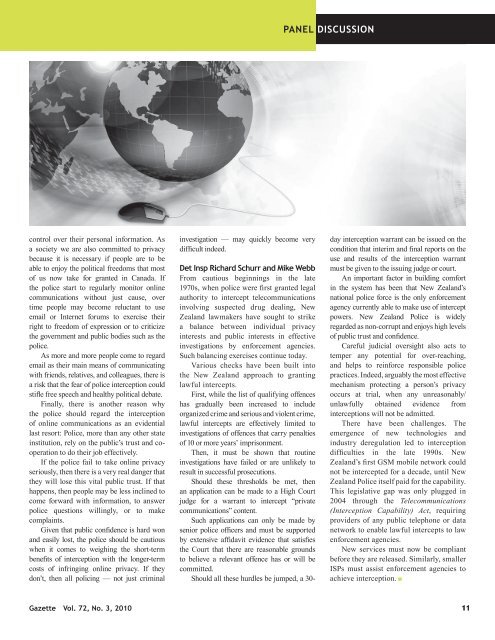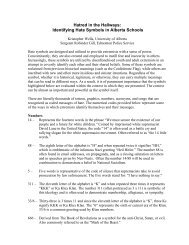PANEl DiSCuSSiONIntercepting online communications:what must be considered when balancinglawful access with privacy rights?The panellists:Sgt Mark Flynn, Covert Intercept Unit, HQ Special “I”, <strong>RCMP</strong>, Ottawabenjamin Goold, Associate Professor, Faculty of Law, University of British ColumbiaDet insp Richard Schurr, manager, Crime Monitoring Centre, New Zeal<strong>and</strong> PoliceMike Webb, national manager, Organisational Performance, New Zeal<strong>and</strong> PoliceSgt Mark FlynnThe technology that people use tocommunicate has rapidly changed in recentyears. The use of the Internet is the mostsignificant change. It is a combinationof the traditional telephone, facsimilemachine, traditional mail, video camera,library <strong>and</strong> more, all carried over an open<strong>and</strong> mostly uncontrolled system. Manypeople use the Internet as their primarymeans of communication. Some even putintimate details of their lives online to sharewith friends, family <strong>and</strong> the world. Othersuse its instantaneous communications,anonymously, to facilitate crimes <strong>and</strong>circumvent the ability of police toinvestigate those crimes.Law enforcement agencies recognize<strong>and</strong> respect the privacy rights of individualsin Canada. The interception of any typeof private communication must take intoaccount the privacy rights of the individual<strong>and</strong> the public interest in the administrationof justice. This is a delicate balance that wasconsidered by Parliament when Part VI ofthe Criminal Code was enacted.Part VI requires that police meet strictcriteria before a judge will allow them tointercept a private communication <strong>and</strong>makes it an offence to do so without judicialauthorization (with few exceptions forspecific situations). That has not changedwith the advent of the Internet.There are several hundred Internet serviceproviders (ISPs) in Canada <strong>and</strong> each networkis unique <strong>and</strong> designed in a manner thatsometimes makes the lawfully authorizedinterception of communications difficult orimpossible. In these investigations, a judge hasreviewed a request from a law enforcementofficer, weighed the privacy rights of theindividual versus the public interest, <strong>and</strong>granted authority to lawfully intercept thecommunications. Sometimes, the interceptioncould not be carried out due to technologicalchallenges or could not be performed in atimely manner. Those involved in organizedcrime <strong>and</strong> child exploitation often takeadvantage of these challenges. In some cases,the lack of intercept capability has jeopardizedpublic safety.In recent years, law enforcement <strong>and</strong>national security agencies have soughtimprovements to lawful access throughchanges in the law to aid in dealing withtechnological challenges when interceptingonline <strong>and</strong> other communication systems.Some refer to the changes as additional policepowers <strong>and</strong> a further invasion of privacy.This is simply not correct: the interception ofonline communications is no different thanthe interception of other types of traditionalcommunications.Police already have the lawful authorityto intercept online communications <strong>and</strong>have been doing so for many years. Lawenforcement agencies are not seeking tochange how this authority is granted. Theelimination of technological challengesthrough new legislation would simply ensurethat an interception will be technologicallypossible, once a judge has granted lawenforcement the legal authority to carry outan interception.Any change to the law should be analyzedto determine if there are new privacyimplications for Canadians to ensure thatthere is no unreasonable state intrusion intotheir personal lives. As such, the best wayto ensure that privacy rights are not beingviolated is to have proper safeguards builtinto the law. Canada has a well-establishedjudicial process that ensures that a balancebetween privacy rights <strong>and</strong> public interestis maintained. This balance is crucial inassuring the safety of our communities.benjamin GooldThere are many things that need to beconsidered before the police should attempt tointercept online communications. Given thatreading someone’s email or monitoring theironline activities without their knowledge isa serious breach of privacy, it is essential forthe police to provide a clear <strong>and</strong> convincingjustification for such intrusions.In particular, they must be able to showthat the interception in question is bothnecessary <strong>and</strong> proportionate, <strong>and</strong> that there isno other, less invasive means of obtaining therelevant information or evidence. In addition,it is vital that the police take steps to ensurethat the information in question is used onlyfor the purposes for which it was originallyobtained, <strong>and</strong> that it is not shared in ways thatmay further infringe the individual’s right toprivacy. Where the police fail to meet thesest<strong>and</strong>ards, there can be little doubt that theiractions — no matter how well intentioned —will constitute an unjustified infringement ofthe individual’s right to privacy <strong>and</strong> possiblyan abuse of due process.In the course of a criminal investigation,it is always tempting for the police to regardan individual’s privacy as less important thanthe prevention of crime or the apprehensionof criminals. Yet it is crucial for the policeto remember that the right to privacy doesnot just exist to protect individuals fromunwanted scrutiny or to help them maintain10<strong>Gazette</strong> Vol. 72, No. 3, 2010
PANEl DiSCuSSiONcontrol over their personal information. Asa society we are also committed to privacybecause it is necessary if people are to beable to enjoy the political freedoms that mostof us now take for granted in Canada. Ifthe police start to regularly monitor onlinecommunications without just cause, overtime people may become reluctant to useemail or Internet forums to exercise theirright to freedom of expression or to criticizethe government <strong>and</strong> public bodies such as thepolice.As more <strong>and</strong> more people come to regardemail as their main means of communicatingwith friends, relatives, <strong>and</strong> colleagues, there isa risk that the fear of police interception couldstifle free speech <strong>and</strong> healthy political debate.Finally, there is another reason whythe police should regard the interceptionof online communications as an evidentiallast resort: Police, more than any other stateinstitution, rely on the public’s trust <strong>and</strong> cooperationto do their job effectively.If the police fail to take online privacyseriously, then there is a very real danger thatthey will lose this vital public trust. If thathappens, then people may be less inclined tocome forward with information, to answerpolice questions willingly, or to makecomplaints.Given that public confidence is hard won<strong>and</strong> easily lost, the police should be cautiouswhen it comes to weighing the short-termbenefits of interception with the longer-termcosts of infringing online privacy. If theydon’t, then all policing — not just criminalinvestigation — may quickly become verydifficult indeed.Det insp Richard Schurr <strong>and</strong> Mike WebbFrom cautious beginnings in the late1970s, when police were first granted legalauthority to intercept telecommunicationsinvolving suspected drug dealing, NewZeal<strong>and</strong> lawmakers have sought to strikea balance between individual privacyinterests <strong>and</strong> public interests in effectiveinvestigations by enforcement agencies.Such balancing exercises continue today.Various checks have been built intothe New Zeal<strong>and</strong> approach to grantinglawful intercepts.First, while the list of qualifying offenceshas gradually been increased to includeorganized crime <strong>and</strong> serious <strong>and</strong> violent crime,lawful intercepts are effectively limited toinvestigations of offences that carry penaltiesof 10 or more years’ imprisonment.Then, it must be shown that routineinvestigations have failed or are unlikely toresult in successful prosecutions.Should these thresholds be met, thenan application can be made to a High Courtjudge for a warrant to intercept “privatecommunications” content.Such applications can only be made bysenior police officers <strong>and</strong> must be supportedby extensive affidavit evidence that satisfiesthe Court that there are reasonable groundsto believe a relevant offence has or will becommitted.Should all these hurdles be jumped, a 30-day interception warrant can be issued on thecondition that interim <strong>and</strong> final reports on theuse <strong>and</strong> results of the interception warrantmust be given to the issuing judge or court.An important factor in building comfortin the system has been that New Zeal<strong>and</strong>’snational police force is the only enforcementagency currently able to make use of interceptpowers. New Zeal<strong>and</strong> Police is widelyregarded as non-corrupt <strong>and</strong> enjoys high levelsof public trust <strong>and</strong> confidence.Careful judicial oversight also acts totemper any potential for over-reaching,<strong>and</strong> helps to reinforce responsible policepractices. Indeed, arguably the most effectivemechanism protecting a person’s privacyoccurs at trial, when any unreasonably/unlawfully obtained evidence frominterceptions will not be admitted.There have been challenges. Theemergence of new technologies <strong>and</strong>industry deregulation led to interceptiondifficulties in the late 1990s. NewZeal<strong>and</strong>’s first GSM mobile network couldnot be intercepted for a decade, until NewZeal<strong>and</strong> Police itself paid for the capability.This legislative gap was only plugged in2004 through the Telecommunications(Interception Capability) Act, requiringproviders of any public telephone or datanetwork to enable lawful intercepts to lawenforcement agencies.New services must now be compliantbefore they are released. Similarly, smallerISPs must assist enforcement agencies toachieve interception. ▪<strong>Gazette</strong> Vol. 72, No. 3, 2010 11







